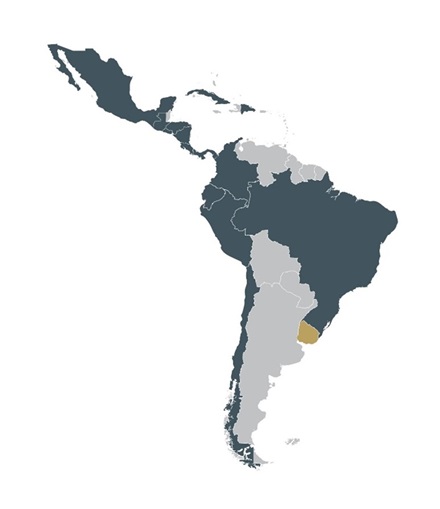[co-authors: Ana Leticia Allevato, Vítor Montovani]
In June, Uruguay committed to join the Patent Cooperation Treaty (“PCT” or “Treaty”), with unanimous approval from both houses of parliament.
The PCT—first signed in 1970, effective for 35 years and currently covering 157 contracting countries—is an essential milestone for the globalization of patent law and, consequently, for the protection of inventions at an international level. The Treaty allows patent applicants more time to seek protection for their industrial property rights in all signatory jurisdictions, while reducing costs and bureaucracy in doing so.
In Latin America, 14 countries are signatories to the Treaty, an adoption rate of 70% relative to all members of the region. Although this figure is lower than the estimated global adoption rate of 81.3%, the region has enormous potential for growth. According to an official report made available by WIPO in 2023, Latin America was responsible for originating 1,127 patent application filings through the PCT system, with Brazil leading the statistics, accounting for 548 filings with the INPI as the Receiving Body. This shows that the patent landscape in the region has ample opportunities for development, indicating a promising future for strengthening the patent system in Latin America.

It is in this context that unanimous approval for Uruguay becoming the 158th signatory to the Treaty is welcomed. According to WIPO statistics, Uruguay has the 92nd-highest number of patent applications filed each year, predominantly in the Life Sciences area (35.7% of all filings). It is therefore to be expected that more inventions in the area will be protected on the international stage—which, as a consequence of the nature of the patent system, also ramps up technological development in the sector.
FILING UNDER THE PCT SYSTEM
The PCT system allows patent applications to be internationalized in a uniform and practical way.
To do this, the applicant must, within 12 months of the earliest filing for the invention they are seeking to protect (i.e. the Priority), file an International Application before any of the Patent Offices that act as Receiving Offices, or before the International Bureau of WIPO.
After the International Filing, the International Search Authority (ISA)1 indicated by the applicant will provide the Priority Search Report, as well as a non-binding Opinion as to the patentability of the invention analyzed. The applicant may also request a Supplementary International Search and a Supplementary Patentability Opinion to be carried out by a second International Search Authority.
The international phase of the PCT System lasts around 18 months, which gives the Applicant a total of 30 months from the Priority Date to file for the National Phase before the patent office of another signatory country.

The PCT procedure offers clear advantages to the applicant for global protection of the invention:
- A 30-month period between the filing of the Priority and the Entry into the National Phase before other patent offices of signatory countries.
- This prevents Priority from being used as a prior art against applications in each country during the 30-month period. Because of this, the applicant has (i) an extended period of time to decide in which territories they might protect their invention; and (ii) time to carry out the necessary procedures.
- The International Search Authority’s prior art search and a technical opinion on the patentability of the invention.
- The technical opinion on patentability provided by an ISA analyzes the novelty and non-obviousness requirements in relation to the relevant gathered prior art. Although it has no binding effect over the patent offices of the countries that are signatories to the Treaty, a positive position of the ISA is received as a strong argument for patentability.
1 WIPO maintains a list of International Search Authorities on its website.
[View source.]